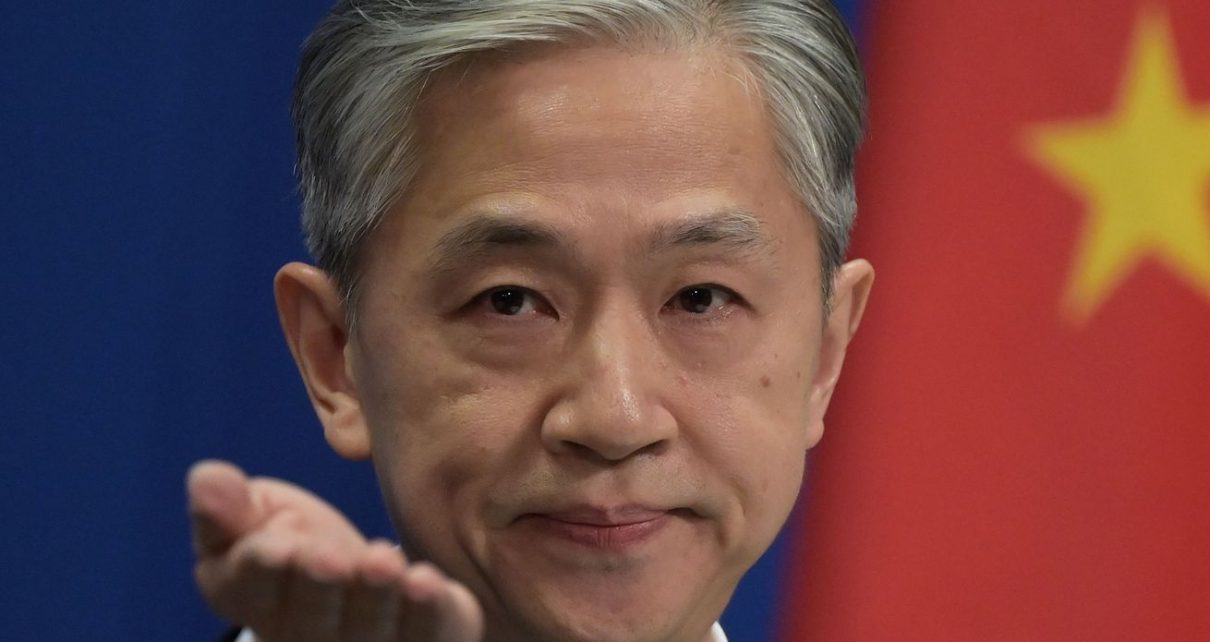
This is a major problem for the United States and other democracies.
China has a new weapon in its global information warfare arsenal: “wolf warriors.”
Named after a popular Chinese nationalistic film franchise, “wolf warriors” are official government diplomats whose duties go beyond the traditional diplomatic functions of closed-door negotiating and hosting fancy embassy soirees — and into the cutthroat world of Twitter.
Armed with 280 characters and access to a platform that has millions of users worldwide but is blocked for most people in China, they fiercely defend China against its foreign critics, ruthlessly taunt countries and leaders who have displeased the Chinese government, and shamelessly spread misinformation that serves Beijing’s interests.
In other words, they’re professional diplomatic trolls.
And oftentimes their efforts have consequences that go far beyond social media and leap into the real world.
Earlier this month, for instance, a Chinese Foreign Ministry official tweeted a fake photo of a grinning Australian soldier holding a knife to an Afghan child’s neck. The image was meant to troll Australia’s government over a recently released report on alleged war crimes committed by Australian soldiers in Afghanistan.
The tweet turned the subject of Australian war crimes into an international diplomatic spat, forcing the Australian government to respond and launching the story into global headlines.
All of this might seem childish. But it’s also incredibly effective, according to Jessica Brandt, head of research and policy at the Alliance for Securing Democracy and a senior fellow at the German Marshall Fund.
After that Chinese official’s tweet trolling Australia, “he gained about 75,000 new followers,” she told me. “That was like a 10 percent increase in a week — that’s huge. China understands that provocation really pays off.”
Brandt recently co-authored a report on China’s wolf warrior diplomats, so I called her up to talk more about the phenomenon: What China is trying to accomplish, how this compares to Russia’s online activities, and how liberal democracies can respond.
Our interview, edited for length and clarity, is below.
Alex Ward
Explain to me what a “wolf warrior” is in China, and why they use Twitter so much.
Jessica Brandt
The term “wolf warrior” comes from a film franchise in China that has a nationalistic bent. The moniker has been used to apply to China’s more aggressive approach in the information space following the Covid-19 pandemic. Wolf warriors — actual Chinese diplomats, in this case — have taken to Twitter to shake up that information space and promote the nation’s standing in the world.
Alex Ward
Are they basically high-level trolls?
Jessica Brandt
Trolling is part of it, but not all of it.
Some of what they do is troll the United States on issues of race, taking a page out of Russia’s playbook. Over the summer after George Floyd’s killing, we saw Chinese diplomats on Twitter use hashtags like #ICantBreathe or #BlackLivesMatter over 250 times. That was in an effort to denigrate the US record on race to deflect from China’s own dismal human rights record.
Alex Ward
I just recently covered the growing China-Australia spat over a war crimes report, where we saw Zhao Lijan, a Chinese Foreign Ministry spokesperson, tweet a doctored image that sparked a whole diplomatic fight with Australia.
Why would China’s government want to start fights with other nations on Twitter?
Jessica Brandt
It’s a departure for China, because it’s traditionally been more conservative in the information space. That makes sense, since China was a rising power with a lot to lose in the recent past.
What’s important here is to think about when these activities started: They’re roughly correlated with the rise of Hong Kong’s pro-democracy protests [in the summer of 2019]. That’s really when this behavior accelerated.
And after the coronavirus spread around the world — and as we know, it originated in China — the goal of the wolf warriors was to deflect blame and criticism. They wanted to sow doubt about what was happening and denigrate democracies, namely those blaming China for not controlling the disease early on.
In the case of the Australia tweet, the goal was to denigrate Australia’s human rights record. Broadly speaking, then, a lot of the online effort is to cast democracies as either feckless, or ineffective, or incompetent, or hypocritical.
Alex Ward
You mentioned China is using Russia’s playbook to reach its goals. Why borrow from what Russia has been doing?
Jessica Brandt
What we’re seeing is a lot of aspects from the Russian playbook, but also some uniquely Chinese aspects to the strategy.
Russia is sort of excellent at denigrating democracy and denting democracy’s appeal. It has a proven track record of aptly highlighting the strengths of an alternative model. That appeals to China.
One way to do that is to lean on the influence networks of other autocracy-minded people. Russia in particular has a vast constellation of personalities, pseudo academics, and bloggers to make the regime’s case for it. They’re basically influencers.
China is now doing the same thing: It’s amplifying the voices of influencers who are motivated by a pro-Beijing, anti-West worldview to push narratives that attack US foreign policy and deny its own human rights record in Xinjiang or Hong Kong.
China is also dabbling in “whataboustism.” The wolf warriors are casting doubt on official versions of events, using multiple conflicting conspiracy theories while using viral content to attract an audience by being really provocative. Think of the Australia tweet, for example.
That said, China is doing something that Russia isn’t, which is engaging with inauthentic accounts, or at least accounts that are highly suspicious. It’s hard to know if these were created by the government or computer-generated accounts. But either way, Beijing’s diplomats have retweeted these accounts hundreds and hundreds of times, and they’re included among the topmost retweeted accounts. Russia doesn’t do that.
It’s possibly just really sloppy tradecraft, and wolf warriors don’t know that they’re tweeting bots. But I think it’s hard to build grassroots support for your social media campaign if you don’t allow your people on the platform.
Alex Ward
Is China’s strategy working?
Jessica Brandt
It’s been really successful. You talked about that Australian tweet: After Zhao’s tweet went out, he gained about 75,000 new followers. That was like a 10 percent increase in a week — that’s huge. China understands that provocation really pays off.
Alex Ward
Clearly. It got Australia’s government to respond, it got me to write an explainer for Vox, and it’s already featuring as a major part of this conversation.
Jessica Brandt
Absolutely. There’s something brilliant about it, as the tweet got more coverage than the original [war crimes] report itself.
Alex Ward
This brings me to a question I’ve had a lot of trouble answering: What to do when government officials are online trolls? On the one hand, the statements they make are technically official government statements. On the other hand, they’re trolling — clearly putting out bait and hoping for a reaction.
The inclination to respond to such provocations seems right to me, because, again, they are official statements. It’d be weird to just ignore them. But that said, it doesn’t seem like ignoring the trolling would do much, either. No one wants to let misinformation, and potentially damaging information at that, go unanswered.
Jessica Brandt
Fundamentally, China’s wolf warriors and Russia in general choose these tools because these are asymmetric. They want to fight the information battle on terms that benefit them.
Democracies, therefore, need to think about this in the context of persistent competition — that’s competition between democracies and autocracies, between open systems and closed systems — all in the information, economic, and political domains. We in the US have been a little bit slow to recognize the full nature of the contest.
So how to deal with this? First is to respond on the terms of our own choosing and not take the bait. Second, and relatedly, is to compete using open, truthful, trusted information.
It’s important to remember that a key idea in a democracy is that there is a truth. We can know it, and we can use it to govern ourselves. Autocracies in their own way are kind of brittle. They’re capitalizing on a short-term vulnerability of ours, sure, but they have a long-term vulnerability, which is that information in their system is a threat. Big picture, then, we need to remember that polluting the information space hurts us much more than it hurts them.
We should engage in a persistent effort to expose, I think, the failures and false promises of their model, which they’re actively promoting as an alternative to ours. We can do that best by withstanding some blows and returning the favor — at times of our choosing — with our truthful information to expose their problems.





